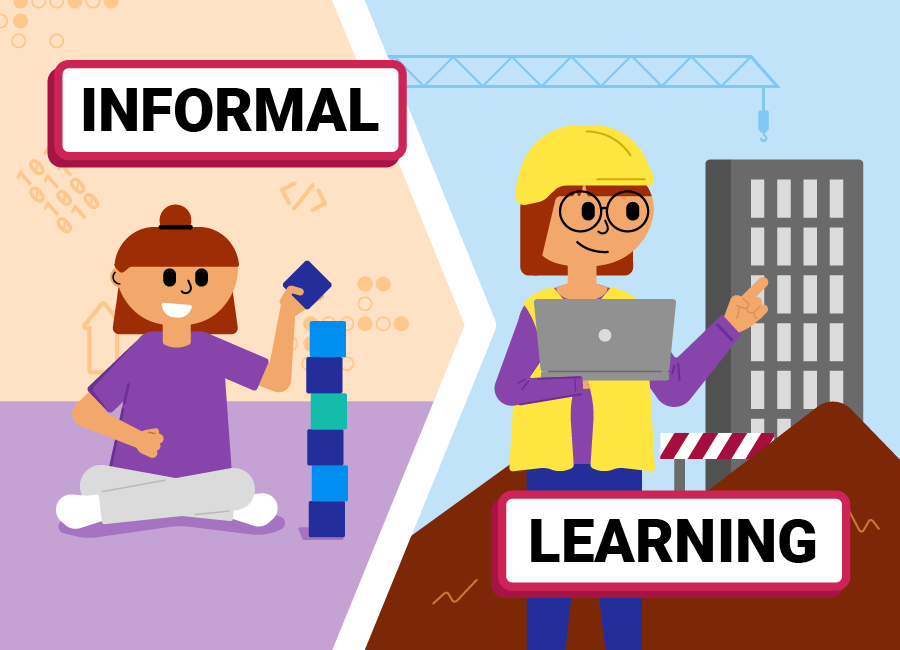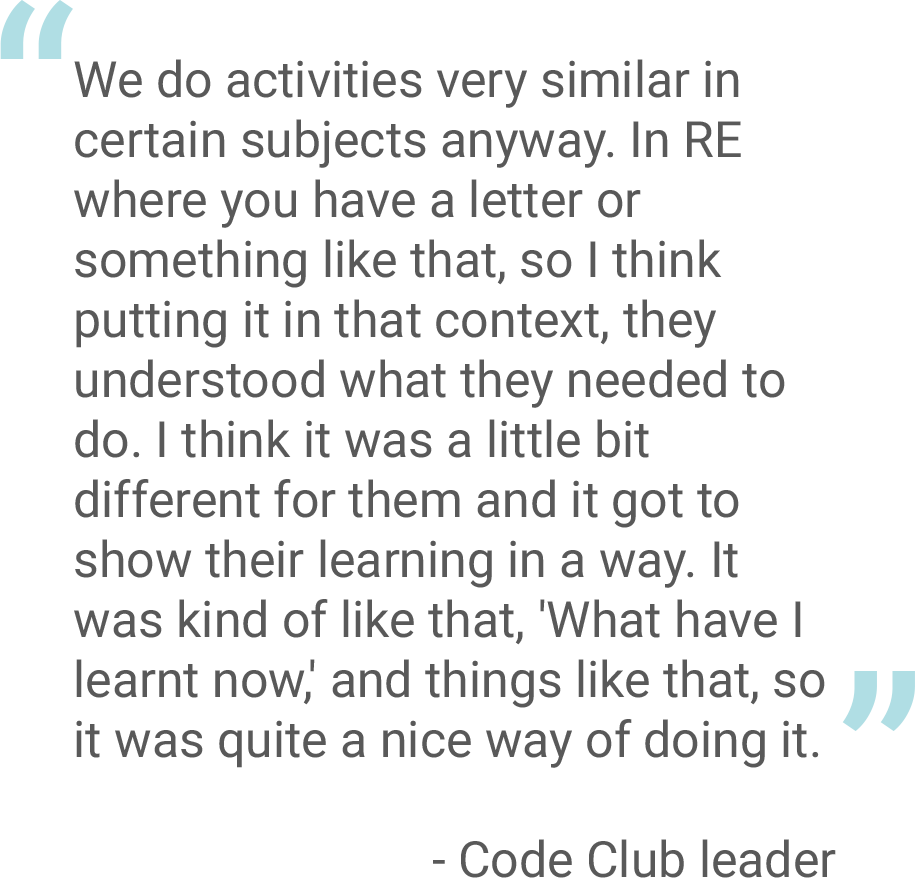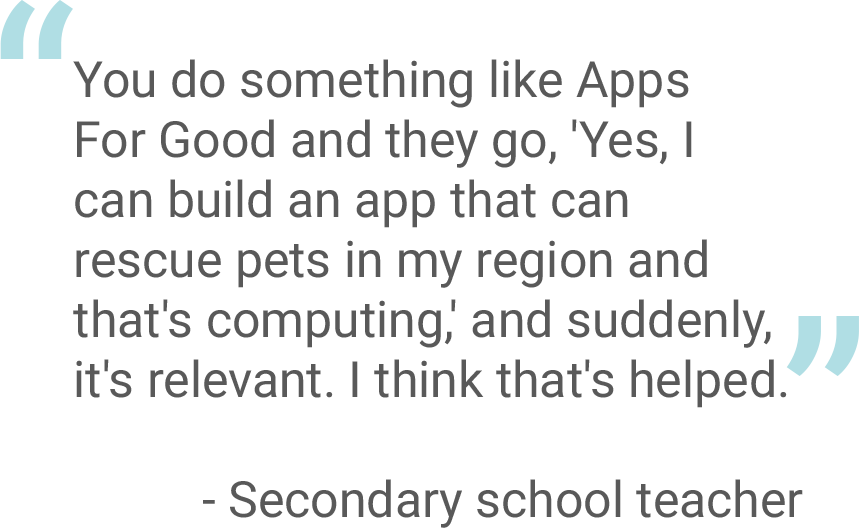
In this intervention, we partnered with the Behavioural Insights Team and Apps for Good to address the issue that girls often do not realise that computing skills learned in non-formal settings can benefit them in formal education This programme consisted of two interventions—one for primary schools and another for secondary schools—adapted from existing non-formal learning resources. The adaptations drew on the behavioural science concepts of endowed progress, where students were shown information about how the skills they were learning could help them to progress towards the goal of succeeding in computing, and self-persuasion, where students were asked to explain to a peer what they had learned to increase their own motivation. The study initially began in Autumn 2019 but was disrupted by the onset of the COVID-19 pandemic and was subsequently repeated.
Primary school intervention
| Date range of intervention | December 2019 – March 2020; October 2021–February 2022 |
| Age of participating students | 7–11 years old |
| Aim of intervention | To explore how the use of the behavioural science concepts of endowed progress and self-persuasion can help children better understand how the skills they use in non-formal computing activities can help them when studying computing more formally |
| Intervention | 12 weeks of after-school sessions in existing coding clubs using Code Club projects from the Scratch, BBC micro:bit, or Python paths |
| Method | Two-arm cluster randomised controlled trial (RCT) – 54 primary schools were assigned at random to either the ‘treatment’ group, using adapted Code Club projects (referred to as Code Club+), or the ‘control’ group, who used existing Code Club projects |
| Evaluation | The intervention was evaluated independently by an organisation called Behavioural Insights Team (BIT). BIT’s evaluation was primarily based on quantitative data collected from learners at the start and the end of the trial using a validated instrument called the Student Computer Science Attitude Survey (SCSAS), which asks learners about their attitudes towards Computing, along with a few additional survey questions specific to this evaluation. The evaluation team analysed the data about girls’ attitudes towards computing and compared the differences between the control group and the treatment group. BIT also visited four schools in the treatment group to collect qualitative data through club session observations, teacher interviews, and a pupil discussion group. This data was analysed using case study methodology. |
Secondary school intervention
| Date range of intervention | December 2019 – March 2020; April–July 2021 |
| Age of participating students | 12–13 years old |
| Aim of intervention | To explore how the use of the behavioural science concepts of endowed progress and self-persuasion can help children better understand how the skills they use in non-formal computing activities can help them when studying computing more formally |
| Intervention | 12 one-hour long sessions in which students created an app solving a problem relevant to their own experiences using AppLab |
| Method | An experimental design using surveys before and after the intervention to measure student attitudes towards computing in 57 schools |
| Evaluation | The intervention was evaluated independently by an organisation called Behavioural Insights Team (BIT). BIT’s evaluation was primarily based on quantitative data collected from learners at the start and the end of the trial using a validated instrument called the Student Computer Science Attitude Survey (SCSAS), which asks learners about their attitudes towards Computing, along with a few additional survey questions specific to this evaluation. The evaluation team analysed the data about girls’ attitudes towards computing before and after the intervention. BIT also visited three schools to collect qualitative data through teacher interviews, and a pupil discussion group. This data was analysed using case study methodology. |


Relative to regular Code Clubs, the Code Club+ intervention showed a slightly positive but statistically insignificant effect on attitudes towards computing and stated intention to select GCSE computer science. Both regular Code Club projects and the Code Club+ resources received positive feedback from teachers and students during interviews. However, teachers indicated that the Code Club+ materials may not have been consistently delivered as intended across all schools, which could have limited their additional impact compared to regular Code Club materials.
Girls participating in the secondary school intervention reported a slight positive shift in their attitudes towards computing. Based on interviews with teachers and pupils, the intervention’s emphasis on real-world problem-solving in their communities made computing more purposeful and attractive to girls. Teachers also highlighted that the focus on creativity and collaboration within the intervention positively influenced girls’ attitudes towards computing. Despite a small increase in positive attitudes, there was no corresponding rise in reported intentions to study GCSE computer science. To address this, adapting materials to more explicitly connect with GCSE computer science content and providing clearer guidance to teachers could help translate positive attitudes into confidence and intentions to pursue GCSE computer science. A randomised controlled trial (RCT) of an improved version of the intervention could provide clearer insights into its impact, allowing for better estimates of its effectiveness.
Although the intervention resources are not available, you are welcome to access the original Code Club projects and Apps for Good resources.
Childs, K. (2021). Factors that impact gender balance in computing. In Understanding computing education (Vol. 1). Proceedings of the Raspberry Pi Foundation Research Seminars.
Leonard, H. C., Quinlan, O., & Sentance, S. (2021, September). Female pupils’ attitudes to computing in early adolescence. In Proceedings of the 2021 Conference on United Kingdom & Ireland Computing Education Research (pp. 1-6). (Open-access author copy, presentation slides, and video presentation)